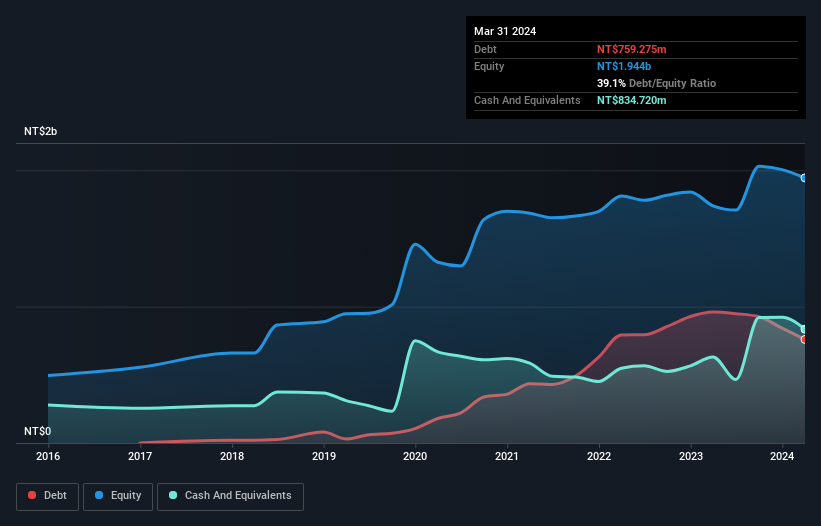Warren Buffett famously said, 'Volatility is far from synonymous with risk.' When we think about how risky a company is, we always like to look at its use of debt, since debt overload can lead to ruin. As with many other companies FineMat Applied Materials Co., Ltd. (TWSE:6698) makes use of debt. But should shareholders be worried about its use of debt?
What Risk Does Debt Bring?
Debt and other liabilities become risky for a business when it cannot easily fulfill those obligations, either with free cash flow or by raising capital at an attractive price. Ultimately, if the company can't fulfill its legal obligations to repay debt, shareholders could walk away with nothing. While that is not too common, we often do see indebted companies permanently diluting shareholders because lenders force them to raise capital at a distressed price. By replacing dilution, though, debt can be an extremely good tool for businesses that need capital to invest in growth at high rates of return. The first step when considering a company's debt levels is to consider its cash and debt together.
View our latest analysis for FineMat Applied Materials
What Is FineMat Applied Materials's Debt?
The image below, which you can click on for greater detail, shows that FineMat Applied Materials had debt of NT$759.3m at the end of March 2024, a reduction from NT$960.3m over a year. But on the other hand it also has NT$834.7m in cash, leading to a NT$75.4m net cash position.

How Healthy Is FineMat Applied Materials' Balance Sheet?
Zooming in on the latest balance sheet data, we can see that FineMat Applied Materials had liabilities of NT$938.8m due within 12 months and liabilities of NT$106.5m due beyond that. Offsetting this, it had NT$834.7m in cash and NT$365.5m in receivables that were due within 12 months. So it actually has NT$154.8m more liquid assets than total liabilities.
This surplus suggests that FineMat Applied Materials has a conservative balance sheet, and could probably eliminate its debt without much difficulty. Succinctly put, FineMat Applied Materials boasts net cash, so it's fair to say it does not have a heavy debt load! There's no doubt that we learn most about debt from the balance sheet. But it is FineMat Applied Materials's earnings that will influence how the balance sheet holds up in the future. So if you're keen to discover more about its earnings, it might be worth checking out this graph of its long term earnings trend.
In the last year FineMat Applied Materials had a loss before interest and tax, and actually shrunk its revenue by 15%, to NT$1.1b. That's not what we would hope to see.
So How Risky Is FineMat Applied Materials?
While FineMat Applied Materials lost money on an earnings before interest and tax (EBIT) level, it actually generated positive free cash flow NT$62m. So taking that on face value, and considering the net cash situation, we don't think that the stock is too risky in the near term. We'll feel more comfortable with the stock once EBIT is positive, given the lacklustre revenue growth. When analysing debt levels, the balance sheet is the obvious place to start. However, not all investment risk resides within the balance sheet - far from it. Case in point: We've spotted 2 warning signs for FineMat Applied Materials you should be aware of, and 1 of them is potentially serious.
If you're interested in investing in businesses that can grow profits without the burden of debt, then check out this free list of growing businesses that have net cash on the balance sheet.
New: AI Stock Screener & Alerts
Our new AI Stock Screener scans the market every day to uncover opportunities.
• Dividend Powerhouses (3%+ Yield)
• Undervalued Small Caps with Insider Buying
• High growth Tech and AI Companies
Or build your own from over 50 metrics.
Have feedback on this article? Concerned about the content? Get in touch with us directly. Alternatively, email editorial-team (at) simplywallst.com.
This article by Simply Wall St is general in nature. We provide commentary based on historical data and analyst forecasts only using an unbiased methodology and our articles are not intended to be financial advice. It does not constitute a recommendation to buy or sell any stock, and does not take account of your objectives, or your financial situation. We aim to bring you long-term focused analysis driven by fundamental data. Note that our analysis may not factor in the latest price-sensitive company announcements or qualitative material. Simply Wall St has no position in any stocks mentioned.
Have feedback on this article? Concerned about the content? Get in touch with us directly. Alternatively, email editorial-team@simplywallst.com
About TWSE:6698
FineMat Applied Materials
Develops, manufactures, and sells high precision metal masks and other metal products in Mainland China, Taiwan, and internationally.
Adequate balance sheet and slightly overvalued.
Market Insights
Community Narratives




